| Srl | Item |
| 1 |
ID:
149199
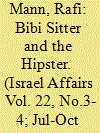

|
|
|
|
|
| Summary/Abstract |
The article focuses on the emergence of a new comical political discourse in the 2015 Knesset elections, in which humour was adopted as a major campaign strategy and senior Israeli politicians took upon themselves the role of comedians in ad clips. The development of such discourse is presented as the culmination of an ongoing process of transformation of the political discourse in Israel since 1977. The process was inspired by the American political and media scenes, as well as by changes in Israel’s media map. Social media played a central role in the new comical discourse, as it was heavily used both for the viral dissemination of the clips and for creating engagement. But even as the affectivity of the videos was apparent in terms of the creation on ‘media buzz’, exposure and web engagement, there is still no proof to its influence on the elections outcome. Furthermore, it raises questions about the ability of the Israeli citizenry to rationally discus crucial issues and to form opinion on them.
|
|
|
|
|
|
|
|
|
|
|
|
|
|
|
|
| 2 |
ID:
163294
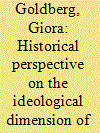

|
|
|
|
|
| Summary/Abstract |
This article argues that since 1977 policy changes of the new Likud government were small, but they engendered a tremendous shift in consciousness, as well as a symbolic change. Israel’s character as a Jewish state was greatly augmented. A new Israeli identity emerged, grounded primarily in Jewish roots with a preference for communal over state identity. Political ideologies in democracies are poor. The ‘iron law of ideology’ states that political parties, principally those that form governments, do not realise their ideological principles. The case of Herut, the maternal party of Likud, is a typical example of this law.
|
|
|
|
|
|
|
|
|
|
|
|
|
|
|
|
| 3 |
ID:
129024


|
|
|
| 4 |
ID:
129236


|
|
|
| 5 |
ID:
123633
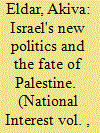

|
|
|
|
|
| Publication |
2012.
|
| Summary/Abstract |
SEEMINGLY, IT was a historic moment. The prime minister of Israel and leader of the Likud Party publicly embraced the two-state solution. A short while into his second term in office, ten days after the newly inaugurated president of the United States promised in Cairo to "personally pursue this outcome," Netanyahu declared an about-face, shifting from the traditional course he and his political camp had once pursued.
|
|
|
|
|
|
|
|
|
|
|
|
|
|
|
|
| 6 |
ID:
149186
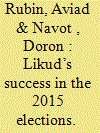

|
|
|
|
|
| Summary/Abstract |
The current article develops an explanation for Likud’s success, which goes beyond the existing structural and circumstantial accounts. It argues that Likud’s success should be sought for in the utilization of Hobbesian logic by its leader, Benjamin Netanyahu. By revealing the commonalities between Hobbes’s political thinking and Rhetoric, and Netanyahu’s political conduct, this paper sheds new light on Netanyahu’s leadership and sources of legitimation and authority in Israel, which are understudied. We demonstrate that Netanyahu’s Hobbesian dimension is best reflected in his understanding of the nature of civil and political rights in the context of an ongoing struggle for survival and self-determination.
|
|
|
|
|
|
|
|
|
|
|
|
|
|
|
|
| 7 |
ID:
148605
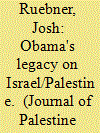

|
|
|
|
|
| Summary/Abstract |
This retrospective assessment argues that despite the arrival in office in 2009 of a president who articulated the case for Palestinian rights more strongly and eloquently than any of his predecessors, U.S. official policy in the Obama years skewed heavily in favor of Israel. While a negotiated two-state resolution of the conflict between Israel and the Palestinians continued to be the formal goal of the United States, Israel's defiant refusal to stop settlement expansion, the administration's determined actions to perpetuate Israeli impunity in international fora, as well as the U.S. taxpayer's hefty subsidy of the Israeli military machine all ensured that no progress could be made on that score. The author predicts that with all hopes of a negotiated two-state solution now shattered, Obama's successor will have to contend with an entirely new paradigm, thanks in no small part to the gathering momentum of the Boycott, Divestment and Sanctions (BDS) movement.
|
|
|
|
|
|
|
|
|
|
|
|
|
|
|
|
| 8 |
ID:
129379
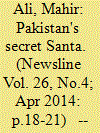

|
|
|
| 9 |
ID:
093896
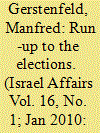

|
|
|
|
|
| Publication |
2010.
|
| Summary/Abstract |
On 26 October 2008 President Shimon Peres called for new elections. The Knesset was dissolved on 11 November. Three candidates claimed that they were in the running for prime minister: Livni, Netanyahu and Barak. The election campaign would focus more on individuals than on parties. The security issue took high priority in the elections. A major issue throughout the campaign was the position of the leading parties on the establishment of two states for two peoples as part of a peace agreement. The internet became a major tool in the campaign. On the morning of 27 December, the IDF began a war in the Gaza Strip, which Israel called Operation Cast Lead. The major parties agreed to suspend their campaigns until the end of the war. Kadima's victory with 28 seats came as a surprise. The Likud came second with 27 seats, having lost voters at the end of the campaign to the third largest party Yisrael Beiteinu, which ended up with 15 Knesset seats. Looking back at the election campaign one can best define it as a broken and shortened one.
|
|
|
|
|
|
|
|
|
|
|
|
|
|
|
|
| 10 |
ID:
129326
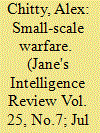

|
|
|
| 11 |
ID:
115924
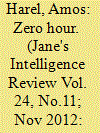

|
|
|